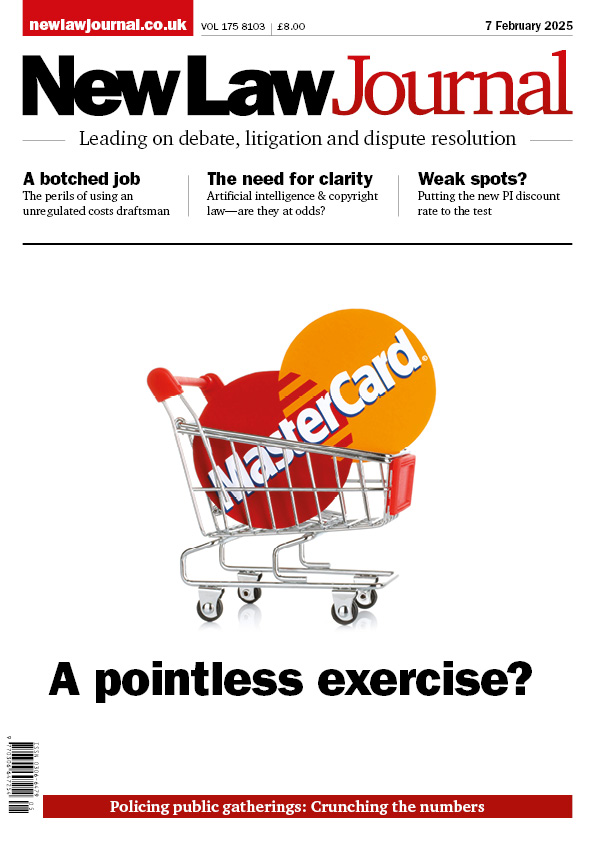THIS ISSUE

While rare, the courts can make passport orders to prevent judgment debtors leaving the country. In this week’s NLJ, Chris Bryden and Clara Parry discuss the use of this legal technique and how these orders are enforced.
The government is considering cutting funding for level 7 apprenticeships, which could ‘seriously impact social mobility in the legal profession’, Rhicha Kapila, partner and chief operating officer at Bolt Burdon Kemp, writes in this week’s NLJ. Level 7, the highest level of apprenticeships, ‘create a qualification path for graduates’ that allows them to be paid while they train.
The personal injury discount rate was increased to 0.5% in January, based for the first time on a detailed report by an expert panel. In this week’s NLJ, Julian Chamberlayne wonders whether the decision-making is vulnerable to challenge by judicial review, and uncovers a multitude of weak spots.
There is an urgent need for clarity regarding the UK’s laws on the use of copyrighted material protection by artificial intelligence (AI) technology, writes Emma Kennaugh-Gallacher, senior professional support lawyer at Mewburn Ellis, in this week’s NLJ.
Horses for courses, a lid for every pot and costs lawyers for costs (regulated, of course). Otherwise, it could all turn into a shambles. In this week’s NLJ, Jack Ridgway, chair of the Association of Costs Lawyers and a senior associate costs lawyer at Bolt Burdon Kemp, highlights the perils of using an unregulated costs draftsman.
How will you spend your £4 Mastercard pay-out? Professor Dominic Regan, NLJ columnist, AKA 'The Insider', writes that the result of the collective action once put at £10bn and later settled for £200m renders it a ‘pointless exercise’.
How will you spend your £4 Mastercard payout? Dominic Regan tots up collective action anti-climaxes & laments expectation versus reality
Cutting apprenticeships is a step backwards for the profession & for social mobility, says Rhicha Kapila
Julian Chamberlayne reviews the new personal injury discount rate & highlights some potential weak spots
Chris Bryden & Clara Parry discuss the rare use of passport orders to prevent someone leaving the country—and how these orders are enforced
MOVERS & SHAKERS

Keystone Law—Milena Szuniewicz-Wenzel & Ian Hopkinson
International arbitration team strengthened by double partner hire

Coodes Solicitors—Pam Johns, Rachel Pearce & Bradley Kaine
Firm celebrates trio holding senior regional law society and junior lawyers division roles

Michelman Robinson—Sukhi Kaler
Partner joins commercial and business litigation team in London
NEWS
The government has pledged to ‘move fast’ to protect children from harm caused by artificial intelligence (AI) chatbots, and could impose limits on social media as early as the summer
All eyes will be on the Court of Appeal (or its YouTube livestream) next week as it sits to consider the controversial Mazur judgment
An NHS Foundation Trust breached a consultant’s contract by delegating an investigation into his knowledge of nurse Lucy Letby’s case
Draft guidance for schools on how to support gender-questioning pupils provides ‘more clarity’, but headteachers may still need legal advice, an education lawyer has said
Litigation funder Innsworth Capital, which funded behemoth opt-out action Merricks v Mastercard, can bring a judicial review, the High Court ruled last week







